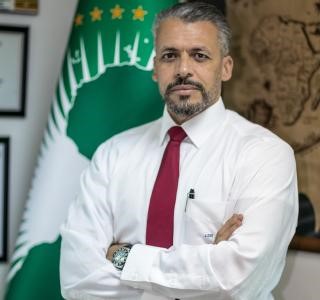English | Français | Português
 Mr. Idriss Mounir Lallali, a prominent figure in the realm of counterterrorism on the African continent, is a distinguished alumnus of the Africa Center. Since 2017, Mr. Lallali has served as the Deputy Director of the African Union’s African Centre for the Study and Research on Terrorism (ACSRT), and he has been leading the institution as its Acting Director since April 2020. In addition to his role at ACSRT, Mr. Lallali is the Head of the Alert and Prevention Unit of the African Union. His leadership has been instrumental in guiding a dedicated team of experts to assess the counter-terrorism capacities of African Union (AU) Member States and to support the development of national and regional strategies aimed at countering terrorism and preventing violent extremism. In this interview, we delve into Mr. Lallali’s insights on the current state of terrorism in Africa, the challenges faced by AU Member States, and the strategic initiatives being undertaken to foster a more secure and resilient continent.
Mr. Idriss Mounir Lallali, a prominent figure in the realm of counterterrorism on the African continent, is a distinguished alumnus of the Africa Center. Since 2017, Mr. Lallali has served as the Deputy Director of the African Union’s African Centre for the Study and Research on Terrorism (ACSRT), and he has been leading the institution as its Acting Director since April 2020. In addition to his role at ACSRT, Mr. Lallali is the Head of the Alert and Prevention Unit of the African Union. His leadership has been instrumental in guiding a dedicated team of experts to assess the counter-terrorism capacities of African Union (AU) Member States and to support the development of national and regional strategies aimed at countering terrorism and preventing violent extremism. In this interview, we delve into Mr. Lallali’s insights on the current state of terrorism in Africa, the challenges faced by AU Member States, and the strategic initiatives being undertaken to foster a more secure and resilient continent.
In your personal view, what are the most pressing security concerns for the African continent?
Mr. Idriss Mounir Lallali (IML): The African continent is grappling with a complex web of security challenges, many of which are interconnected and demand a multifaceted response. The African Union (AU), in its efforts to stabilize the region, has identified several key threats, including transnational organized crime, violent extremism, and regional rebellions. These challenges are not isolated; they often feed into one another, exacerbating instability across borders and creating an environment where violence can easily spread. Among these, terrorism has emerged as the most pressing issue, with groups exploiting weak governance, poverty, and social unrest to expand their influence. The rise of terrorism is not confined to one region; it has taken on a transcontinental dimension, with terrorist networks extending their reach from East Africa through West Africa and now into Southern Africa.
This geographic expansion of terrorist groups is particularly alarming because it signals a growing sophistication and adaptability among these organizations. Their ability to move across borders and establish footholds in new regions highlights the urgency for a coordinated and comprehensive counterterrorism strategy. The AU alongside regional bodies and international partners must prioritize the development of robust counterterrorism measures that not only address immediate threats but also tackle the root causes of terrorism, such as socio-economic disparities and political disenfranchisement. Strengthening collaboration among Member States and with external partners is crucial to curbing the spread of terrorism and ensuring long-term security and stability across the continent.
Have you been working on any projects that you would like us to highlight?
IML: Certainly. We have been deeply involved in assisting AU Member States with the development of counterterrorism strategies and action plans. Additionally, we support regional economic communities in strengthening their counterterrorism capacities. One of our significant initiatives is compiling a compendium of best practices. This resource is designed to inspire and guide our Member States by showcasing successful strategies, particularly those implemented within Africa, allowing them to adapt and refine their approaches.
Furthermore, we are building crucial partnerships across the Atlantic, working closely with technical assistance providers and donors. Our goal is to ensure that the continent’s priorities are met effectively, efficiently, and in a coordinated manner. This collaborative approach is key to addressing capacity-building needs and achieving our objectives.
What advice would you give to up-and-coming security sector officials?
IML: It’s essential for emerging security officials to recognize the profound impact they have on the daily lives of the populations they serve. Security should be viewed as a public service, not merely as enforcement or control. Citizens see security officials as providers of safety and protection, so it’s important that officials take a more responsive approach, considering the specific needs and expectations of the public.
A bottom-up approach, where security programs reflect the priorities and inputs of the citizens, is crucial. This approach ensures that security is perceived as a service rather than as a form of oppression, fostering trust and cooperation between the public and security agencies.
Is there anything that you think the Africa Center should provide?
IML: I believe the Africa Center should continue its invaluable work in fostering interaction between African and Western practitioners. Building bridges between these groups is vital for mutual understanding and effective coordination of actions. By continuing to provide opportunities for dialogue and collaboration, the Africa Center plays a critical role in enhancing the capacity of African security practitioners while also fostering stronger international partnerships.

